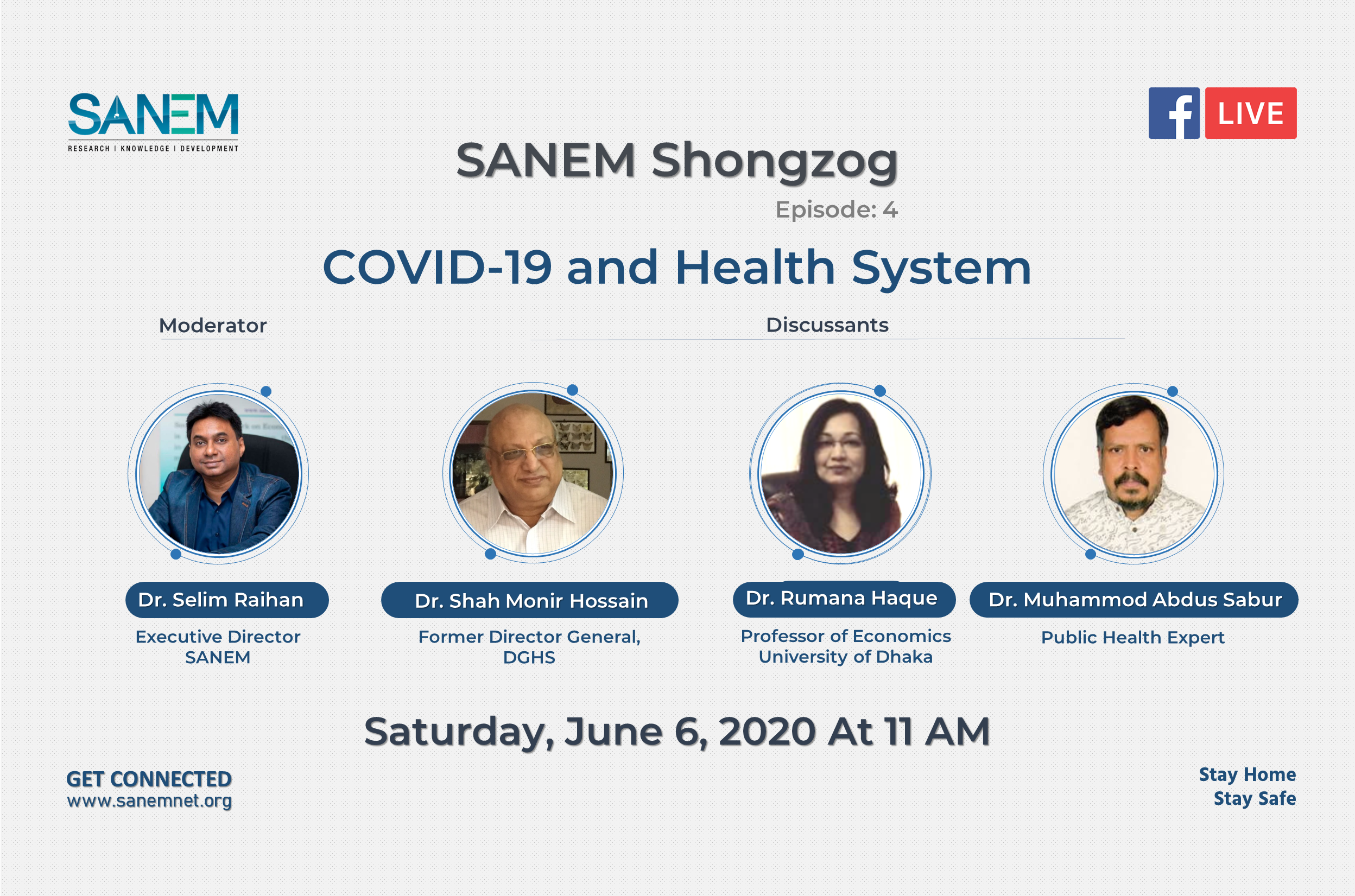Previous Events
SANEM Shongzog | Episode 4
COVID-19 and Health System
1 June 2020, Dhaka

A webinar titled “COVID-19 and Health System of Bangladesh”, organized by South Asian Network on Economic Modeling (SANEM), took place on June 6, 2020 at 11.00 AM. The webinar is the fifth in the series titled “SANEM SHONGJOG”, which aims to foster meaningful academic discussions on domestic and global socio-economic issues. Conducted by SANEM’s Executive Director and Professor of Economics at University of Dhaka, Dr. Selim Raihan, the webinar hosted a panel discussion which was attended by Professor Dr. Shah Monir Hossain, Former Director General, Directorate General of Health Service, Government of People’s Republic of Bangladesh, and one of the eight members of a government-formed expert committee to supervise, monitor and support the coronavirus response, Dr. Muhammod Abdus Sabur, Public Health Expert, and Adjunct Professor, Institute of Health Economics, University of Dhaka and Dr. Rumana Haque, Health Economist, and Professor, Department of Economics, University of Dhaka. Around 50 participants including professionals, development practitioners, researchers, journalists, and students joined the webinar through the video conferencing app ZOOM. The webinar was streamed live on the Facebook page of SANEM.
In his introductory remarks Dr. Selim Raihan presented some key statistics to compare the state of the health sector of Bangladesh with other countries. He mentioned that hospital bed per 1000 people in Bangladesh is 0.8, while it is 3.6 in Sri Lanka, 1.9 in Malaysia and 2.1 in Thailand. According to WHO, Public health expenditure in the percentage of GDP in Bangladesh is only 0.4% while it is 1.6% in Sri Lanka, 2% in Malaysia and almost 3% in Thailand. Out-of-pocket expenditure in the percentage of total health expenditure in Bangladesh is 74%, which means a person has to bear 74% of health expenditure on his own. It stands at 50% in Sri Lanka, 38% in Malaysia and 11% in Thailand. Dr. Raihan explained that the current crisis shows that there is no alternative to public health service; yet, the public health sector has not been paid attention to. He also added that there is a serious lack of accountability in the private health sector, which creates significant obstacles in ensuring quality health service for the people. Dr. Raihan recommended that along with an increase in allocation of budget for the health sector, necessary infrastructure and human capital have to be developed and management capacity must be expanded. He put emphasis on the importance of planning and implementation of planning. Dr. Raihan also said that due to illegal activities of rent-seekers, progress in the health sector is being seriously harmed. In order to undo these problems and address these challenges, political will is of utmost importance.
Discussing the policy response to the COVID-19 Pandemic, Dr. Rumana Haque, said that although there was time for preparation, proper planning was absent. Channeling the budget allocations for addressing the pandemic was necessary. She pointed out that there was a delay in detailing the response plan which reflects lacking in capacity in financing management. She remarked that improvement of the health sector would require a unit for health technology assessment and assessment of area-wise health needs and health care needs; without these assessments, an increase in budget would not bear fruit. She further discussed the process of budget allocation and pointed out that disbursement of the budget often takes one quarter of a financial year, thus leaving a significant portion of the development budget unused. Dr. Haque remarked that the involvement of public health experts and coordination with local government is crucial to tackling the pandemic. With increased allocation for preventive care, the health sector must be prioritized in the development agenda. Dr. Haque presented her analysis of the advantages Bangladesh is enjoying from its demographic dividend, however, she cautioned that once the dividend is inversed and the majority of the population turns older, the health system will be under huge pressure, which will have long-term consequences. Whiles immediate actions are necessary to improve the health situation, members of society need to raise these issues of concern more frequently.
Dr. Muhammod Abdus Sabur pointed out that the revenue budget for the ministries is fully utilized as it is for salaries; on the other hand, the development budget faces delay and often remains unused. He said that while development partners have been quick to provide aid to tackle the COVID-19 Pandemic, there has been a delay in the utilization of the aid as well. Discussing the lack of management efficiency, he said that without putting an end to the illegal activities of dishonest contractors, the procurement processes in the health sector can’t be turned effective. Reflecting on the lack of accountability in the private health system, he said that the private health sector is double in size than the public health sector. The Medical Practice Private Clinics and Laboratories (Regulation) Ordinance of 1982 to regulate the private health sector has not been updated and therefore it has not been possible to address the wrongful practices. He said that policymakers are overly enthusiastic about constructing infrastructure, where there is a huge lack of human capital to operate those infrastructures. Decentralization is necessary in this regard. He remarked that the response to COVID-19 is on an ad hoc basis and lacks proper planning. Business leaders’ assumption that the immunity of poor people is somehow stronger is an unfounded claim.
Dr. Shah Monir Hossain identified bureaucratic interference as a reason behind the lack of decentralization. He said that plans are often results of “table talks” and not based on evidence. The public, private and NGO health enterprise need to work together for the improvement of the whole scenario. A forum is required to assess the impacts of these enterprises. The health department should not be functioned through a cadre service rather it should be separate with
